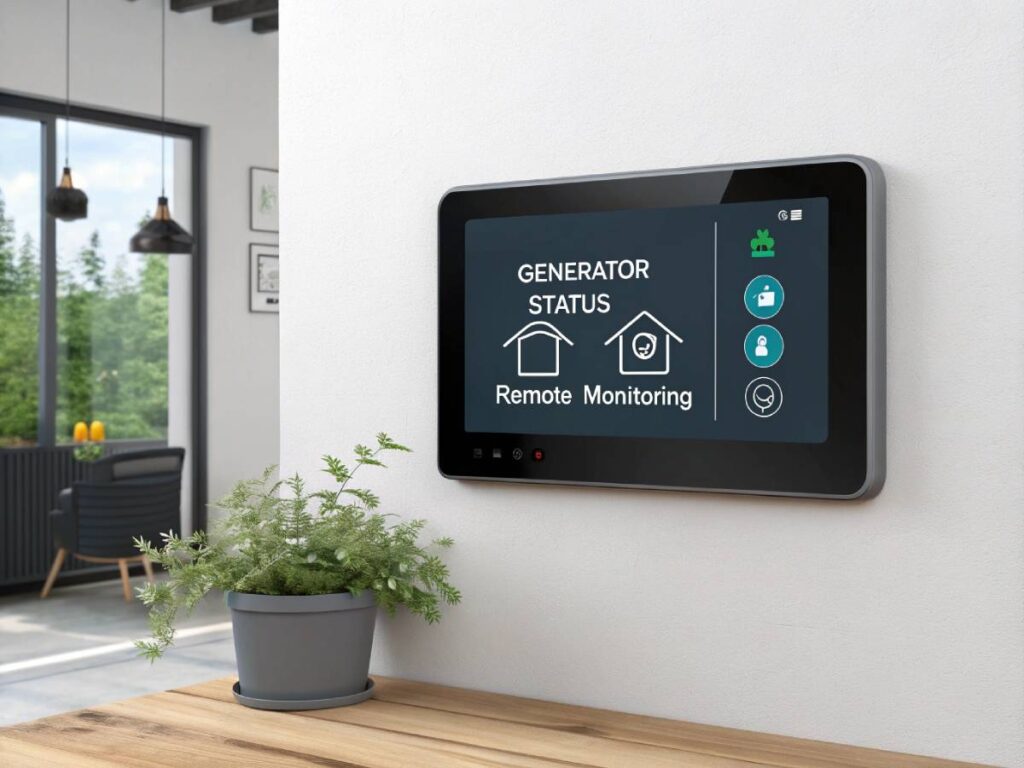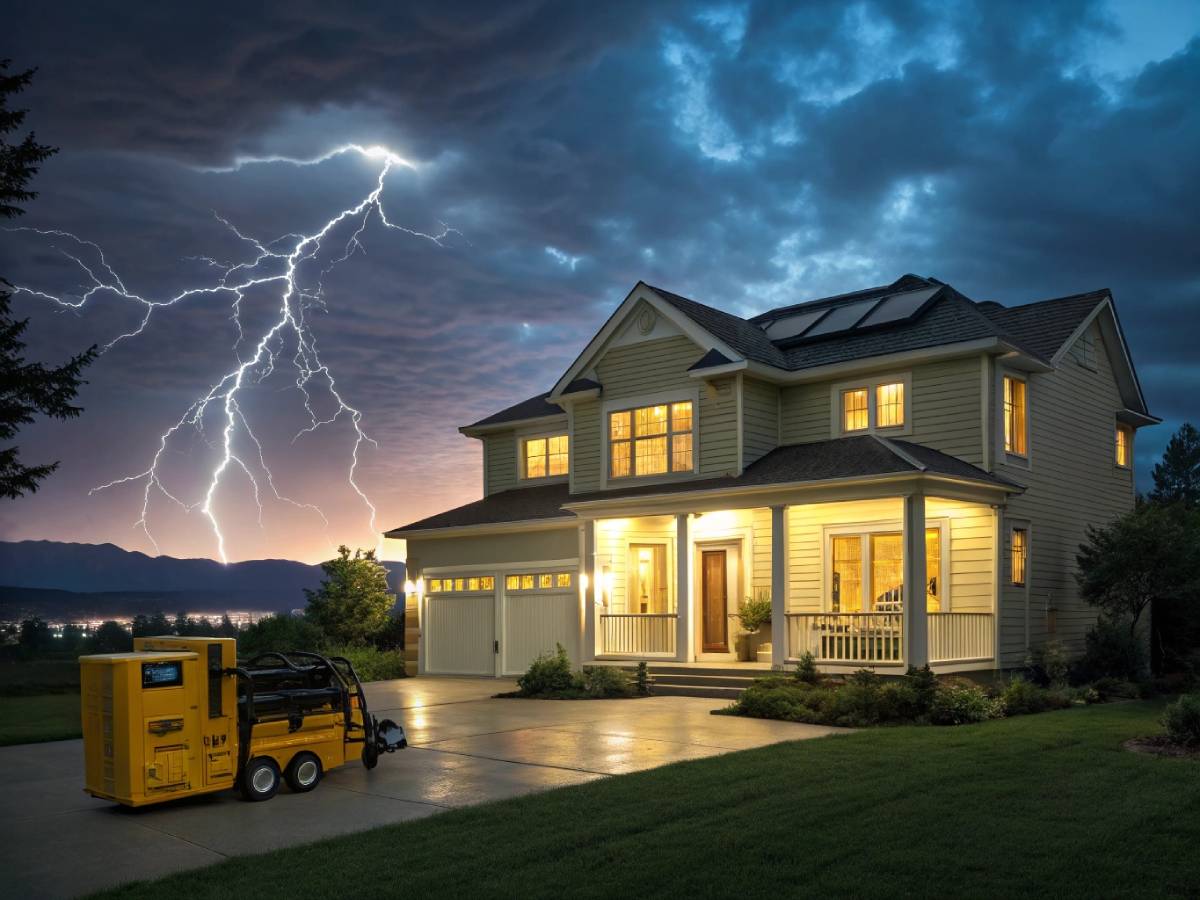When the unexpected strikes and darkness falls, maintaining your home’s comfort and safety becomes paramount.
Enter the world of whole house generators—your reliable guardians against power outages.
Imagine never missing a crucial phone call, keeping your food fresh, and ensuring your home office stays operational, no matter what Mother Nature throws your way.
This guide dives deep into the best whole house generators, ensuring you stay prepared and protected with seamless power backup solutions tailored to your needs.
Whole House Generators
Whole house generators? Yep, they’re like superheroes for keeping the lights on. If Martha from down the street never bats an eyelid during a storm, it’s probably thanks to one of these. Particularly handy for homes where flickering bulbs or silent kitchens aren’t just a mood-killer—they’re a real problem.
Understanding the Need for Whole House Generators
When the power takes a vacation, life gets funny. Funny like “I can’t charge my phone” or “Oops, the fridge is warming up the leftovers.” Oh, and if the security system relies on electricity, you might want to start clutching that old baseball bat tighter. Whole house generators step in like a trusty sidekick, keeping things humming along even when the grid misbehaves.
| Scenario | What Happens Without a Generator | What Happens With a Generator |
|---|---|---|
| Power Cuts | Candles, free fan installation, stress test for your freezer | Just another cozy night in |
| Medical Devices | “Call the doctor… maybe?” | Smooth sailing, no health panic |
| Home Office | Can’t finish the meeting or save that file | When the not-so-digital workforce prevails |
It’s like magic: the generator senses power’s brief departure and boots up faster than you can say “not again.”
Benefits of Installing a Whole House Generator
Shelling out for a whole house generator isn’t just about avoiding candle-lit dinners and preserving ice cream.
Uninterrupted Power Supply

You keep watching that binge-worthy series while the neighbor’s lights blink out. All things stay juiced up, from your AC to the coffee machine that fuels your mornings.
Protection for Sensitive Electronics
Those power blips can fry your fancy tech quicker than eggs on a hot sidewalk. Generators keep the voltage steady and your devices happy.
Increase in Property Value
A standby generator makes a house listing fluffier—translating to dollar signs. People like the idea of being prepared for whatever Mother Nature throws.
Peace of Mind
Power cuts are sneeze-inducing stresses, especially with hospital-grade beeps or unsubmitted presentations hanging over your head. Knowing you can soldier on, no matter the storm outside, is a big win.
For oodles of specifics, peek at our full standby home generators guide.
Embrace the comfort of an always-on lifestyle with a whole house generator. They’re not just investments; they’re sane-keepers. Check all the deets on smart home standby generators and standby generator maintenance tips to make that hardware last and last.
Factors to Consider Before Purchasing
Buying a whole house generator isn’t just another shopping spree. It’s more like picking out a new family member. Let’s dive into what you need to know to keep the lights on when everything goes dark.
Power Needs Assessment
Before you bring home that shiny new generator, you gotta know just what you’re powering. Here’s where you play the numbers game: add up all the watts that keep your everyday appliances going. Some big players to keep in mind:
- Fridge: Sips 600 watts
- The all-powerful AC: 2,000 to 5,000 watts (choose wisely)
- Lights: 400 to 600 watts of glow
- Medical devices: Between 400 to 800 watts
Here’s a quick look at some typical wattage you might deal with:
| Appliance/System | Estimated Wattage |
|---|---|
| Refrigerator | 600 |
| Air Conditioner | 2,000 – 5,000 |
| Lighting Circuits | 400 – 600 |
| Medical Equipment | 400 – 800 |
For a deeper dive on just how much power you’ll need, check out our handy-dandy guide on sizing a standby generator for your abode.
Fuel Type and Availability
Fuel type? It’s like picking your favorite beverage—it’s gotta be right for you. Consider natural gas, propane, or diesel. Here’s a quick lowdown:
- Natural Gas: If you’ve got a hookup to a gas line, this might be your best buddy—no need to stow away extra tanks.
- Propane: Must be stored in hefty tanks on-site, but it lasts ages.
- Diesel: Fantastic energy bite, but you’ll deal with refueling and regular check-ups.
Need some more fuel for thought? We’ve got an article on natural gas versus propane for standby generators just for you.
Size and Placement Considerations
Think of your generator’s size and placement like selecting the right sofa for your living room—it’s gotta fit, work, and be safe. Here’s how to keep it real:
- Generator Size: Make sure it’s got the muscle to handle your house’s power cravings.
- Placement: Park it at least five feet away from windows and doors to keep unwanted exhaust from coming inside.
Curious about what’s needed before plonking down your generator at home? Meander over to our article on preparing for standby generator installation.
Got your checklist ready? Make a savvy decision when picking the right generator so you’re ready when the lights play hard to get. Curious about different types and which love language they speak? Click through our extensive home generators guide to learn more.
Types of Whole House Generators
Figuring out the perfect whole house generator for your crib depends on what you’re looking for and need. Let’s have a chitchat about three main types: standby, portable, and inverter generators.
Standby Generators
Standby generators are your trusty sidekicks for those emergencies when the lights go out. These bad boys chill outside your house and jump into action automatically when the power goes out, no command needed! They hook up to your electrical system and usually munch on propane or natural gas for fuel. They’re a big deal for bigger homes or if you’ve got stuff like medical gadgets or a home office needing juice non-stop.
Key Features
- Turn on by themselves
- Hooked up to your electricity
- Works on propane or natural gas
- Made for medium to big homes
| Feature | Benefit |
|---|---|
| Auto Activation | Smooth power switchover |
| High Power Punch | Covers all house needs |
| Fuel Flexibility | Pick between propane and natural gas |
To learn more about standby generators, hit up our standby home generators guide.
Portable Generators
Now, portable generators are like the Swiss Army knife of power tools. They’re super flexible, letting you power up your home in an outage or keep things humming in a far-off location. Running on gasoline, diesel, or propane, they don’t need you to wire them into your house. You’ll have to pull them out and set them up when needed, though. Not as beefy as standby ones, but they’re handy and light on the wallet.
Key Features
- Can move them around
- You set them up
- Fuel options: gas, diesel, propane
- Good for small to medium spots or specific needs
| Feature | Benefit |
|---|---|
| Mobility | Use wherever you need |
| Fuel Choices | Lots of options |
| Budget-Friendly | Won’t break the bank |
Check out our article on standby vs portable generators for a lowdown on the showdown.
Inverter Generators
Inverter generators? They’re all about providing clean power, perfect for those sensitive electronics you don’t wanna fry. They’re more like the quiet type and sip fuel like a gentleman compared to the bulkier portable generators. These can also buddy up with another inverter to boost power, if needed. Not as powerful as standby, but they’re efficient and less noisy—a win for those valuing peace and quiet.
Key Features
- Delivers smooth power
- Husks down the noise
- Can hook up to another inverter
- Great for gentle gadgets and small homes
| Feature | Benefit |
|---|---|
| Smooth Power | Safe for electronics |
| Low Noise | Keep it peacefu |
| Efficient | Run longer on less fuel |
For more insights on planet-friendly and efficient options, mosey on over to our article on standby generator fuel efficiency.
When it comes down to choosing the right generator for your palace, think about power needs, what it eats (fuel-type), and features tickling your fancy. For the 411, hop over to our article on how to choose the right generator.
Features to Look for in Whole House Generators
Picking out the ideal whole house generator to keep your home running smoothly isn’t just about the size or the look. It’s all about what makes life easier, friendlier to the earth, and keeps everything humming along safely and soundly. So let’s get into what really matters when choosing the right one:
Automatic Transfer Switch
Automatic Transfer Switch (ATS) is like a superhero cape for your whole house generator. When the power decides to take a lunch break, this nifty gadget flips the switch to generate your backup power, faster than you can say “outage.” Plus, it does a number on preventing any nasty power surge surprises that might fry your beloved gadgets or life-saving equipment. If your life depends on a steady power supply like that for home offices or medical gear, an ATS is your new best friend. Looking for more info? Our standby home generators guide has got you covered.
Remote Monitoring Capabilities
Got a smartphone? You’re already halfway to checking on your generator like a boss even when you’re out grocery shopping. Remote monitoring gives you the lowdown on how your generator is holding up, keeping you on top of performance stats, when to fuel up next, and what maintenance might be around the corner. It fits right into a tech-savy, gadget-loving household with ease. Check our piece on smart home standby generators for the juicy details.
Fuel Efficiency
Let’s talk dollars and common sense. Fuel efficiency in a generator equals keeping costs down and cutting back on what’s not so great for the planet. Different generators, depending on what they’re chugging along on (be it natural gas, propane, or diesel), guzzle fuel at their own speed. Do the research and pick one that balances cost and need. More insights are a click away in our guide on natural gas vs propane standby generators.
| Generator Type | Fuel Efficiency (Approximate Runtime per Gallon) |
|---|---|
| Natural Gas | 10+ hours |
| Propane | 5-10 hours |
| Diesel | 7-12 hours |
Want to be a fuel-smart genius? Take a peek at our standby generator fuel efficiency article.
Choosing features that truly matter in a whole house generator means a world where blackouts don’t rain on your parade. From making sure power kicks in at the drop of a hat, to eyeballing your generator like it’s part of your home tech, to keeping Mother Nature happy—all these make life cozier and safer. Need more tips and tricks for picking your generator champ? Head on over to our best standby generators for home guide.
Integration with Smart Home Technology
Bringing smart home tech into the mix with whole house generators is like upgrading your home to run like a well-oiled machine when the lights go out. It’s all about keeping things chill and easy when the power’s on the fritz.
Advantages of Smart Home Integration

Today’s generators aren’t just mindless machines—they play nice with smart home gadgets, serving up loads of perks:
- Real-time Monitoring: Keep an eye on your generator like a hawk from anywhere, thanks to nifty apps that show you what’s what.
- Automatic Notifications: Never miss a beat—get pinged right to your phone for maintenance, power blips, or when it’s time to top off the juice.
- Enhanced Control: Boss your generator around remotely and manage power like a pro.
- Energy Efficiency: Let your smart system do the heavy lifting by tweaking energy use based on live data, cutting down wastage.
Plugging into smart home tech isn’t just an upgrade—it’s like hiring an assistant that’s always on call, especially for those who live for tech wizardry. Want to know more about what smart homes bring to the table? Check out the skinny on smart home standby generators.
Compatibility with Home Automation Systems
Hooking up with home automation is key for a smooth ride. Here’s what to keep in mind:
- System Compatibility: Make sure your generator gets along with the big crew like Alexa, Google Home, and Apple HomeKit.
- Connection Protocols: See if it’s down with Wi-Fi, Bluetooth, or Zigbee to keep talking to all your smart gear.
- Software Updates: Keep it fresh with updates for smoother ops and tighter features.
- Ease of Use: Go for simple, breezy interfaces and apps that make handling it a walk in the park.
| Feature | Description |
|---|---|
| Smart Platform Compatibility | Amazon Alexa, Google Home, Apple HomeKit |
| Connection Protocols | Wi-Fi, Bluetooth, Zigbee |
| Notification Types | Maintenance, Power Outages, Fuel Levels |
| Control Interface | Mobile Apps, Smart Displays |
Get wise to these details, and you’ll snag one of the best whole house generators that jives with your smart setup, making life dependable and hassle-free. Hungry for more? Peek at our pieces on standby home generators guide and sizing standby generator for home.
Installation and Maintenance
Setting up your home-wide generator right and giving it some TLC now and then is like making sure your car’s got gas and oil – it just won’t grind if you don’t. This handy bit will break down the nuts and bolts of hiring the pros or flexing those DIY muscles for getting your generator up and running, plus some top tips on keeping it purring smoothly.
Professional Installation vs. DIY
Thinking about whether to call in the experts or go it alone? Here are the things you gotta ponder – how tricky is the job, and do you know your socket wrench from your elbow? Going pro’ll hit your wallet harder, but here’s what you get:
- Know-How: Certified techies have been around the block and know their stuff back to front.
- All Secure: Letting the pros handle it means they’ll make sure nobody gets zapped.
- Keepin’ Your Warranty: Loads of makers insist on pro set-up if you want that safety net of a warranty.
Now, if you can handle a screwdriver and have a knack for following those thick manuals, DIY might be calling your name. But before you dive into that toolbox, here’s some food for thought:
| Factor | Professional Installation | DIY Installation |
|---|---|---|
| Cost | High | Low |
| Skill Needed | Some to Lots | Loads |
| Warranty | Under Wraps | Possible Bye-Bye |
| Safety | Top Notch | Depends on You |
Want the nitty-gritty on getting that generator installed? Swing over to our standby generator installation guide.
Routine Maintenance Tips for Longevity
Keeping your generator in top shape means giving it a peek and tune-up every now and again. Here’s how you can keep it in tip-top condition:
- Peek at Oil: Make it a habit to check and swap out that oil so the engine stays happy.
- Filters Are Friends: Dust off or swap those air and fuel filters per your manual’s say-so.
- Battery Check: A dead battery won’t start this party, so make sure it’s juiced up.
- Keep It Runni’: Let it hum for 20-30 minutes every month. It’s its way of saying “still here!”.
- Giving It an Eyeball: Look for the ugly stuff – wires coming undone or a rusty patch.
Especially if nasty weather’s on the way, this ain’t the time to slack on upkeep. Our standby generator upkeep cheatsheet spills all the beans for those who want more detail.
Add these checks to your to-do list, and think about calling in a pro for a yearly once-over. It’ll help your generator live a long, happy life and ensures it’s ready to rock when the lights go out. If you’re still figuring out which generator is your home’s new best friend, check out our guide to the best whole house generators to weigh up your options.
Cost Considerations
Imagine sitting down and sorting out the dollars and cents when buying a whole house generator. It’s all about knowing where your cash is headed. You got the upfront costs, then there’s the stuff you have to keep on paying as you go.
Initial Investment
First off, let’s talk about that initial hit to your wallet. You’re paying for the generator and getting it hooked up at home. Things like how much power it can crank out, the brand name you’re buying, and any bells and whistles can make that price tag sway a bit. Hiring a pro to set it up? That’s another set of costs, depending on how tricky it gets and any extras you might need.
| What You’re Paying For | Estimated Cost |
|---|---|
| Generator Unit | $2,500 – $10,000 |
| Professional Install | $500 – $2,500 |
| Necessary Extras (like a transfer switch) | $200 – $800 |
| Permits and Inspections | $100 – $500 |
For a closer look at what goes into installing one of these beasts, check this out: standby generator installation.
Operational Costs
Now, let’s chat about what it’s going to cost to keep the lights on, literally. Operational stuff means fuel, upkeep, and fixing things when they break. Prices depend a lot on the fuel type, how often you fire it up, and how hard it has to work.
| Cost Component | What It Might Run You Yearly |
|---|---|
| Fuel (Natural Gas/Propane/Diesel) | $300 – $1,000 |
| Maintenance (Regular Check-ups) | $150 – $400 |
| Repairs | $100 – $800 |
Choosing your fuel can really change up these numbers. If you’re on the fence, maybe give our piece on natural gas vs propane standby generators a read.
Keepin’ it well-maintained means it sticks around longer and runs better. Peek at our standby generator maintenance tips for some keep-it-running-like-a-dream advice.
Knowing both what you’ll shell out at the start and what you’ll need to continue spending helps you plan your budget just right. Find more in-depth cost breakdowns in our standby generator cost analysis article.
Selecting the Best Whole House Generator for Your Home
Picking a generator to keep your home humming during outages can feel like choosing a meal from a menu in another language without a picture guide. But no worries, we’ve got the lowdown to help you find the generator that fits your life just right.
How to Choose the Right Generator
Getting the perfect generator means considering a bunch of practical stuff. Here’s what you gotta think about:
Power Needs Assessment
First, list out everything electric in your house that’s important to keep running—your fridge, the heater, maybe even your favorite binge-watching setup. Jot down the wattages and crunch those numbers to see what your generator should handle. Our sizing standby generator for home guide can walk you through this, step by step.
| Appliance | Average Wattage |
|---|---|
| Refrigerator | 700 |
| HVAC System | 3500 |
| Electric Stove | 1500 |
| Lights (10 bulbs) | 600 |
| Computer | 200 |
Fuel Type and Availability
Pick a fuel type that’s cheap and easy to get where you live. There’s natural gas, propane, and diesel—each comes with its own set of perks and quirks. Check out our chat on natural gas vs. propane standby generators for more insight.
Size and Placement Considerations
Figure out where this generator’s gonna live. Make sure you follow local rules about how close it can be to your house. We’ve got some tidbits on this in our standby generator installation guide.
Customizing Your Power Solution
Fine-tuning your generator setup is a game-changer for keeping things smooth. Here are some tips:
Automatic Transfer Switch
This nifty gadget automatically shuffles electricity from the grid to your generator when the lights go out, so there’s no fuss. Dive deeper in our standby home generators guide.
Remote Monitoring Capabilities
Want to keep an eye on your generator’s performance from your phone? Look for remote monitoring options. Great for the techie or the jet-setter. More on this in smart home standby generators.
Fuel Efficiency
Go for a generator that’s easy on the fuel. You’ll get longer runtimes when the going gets tough. Check out standby generator fuel efficiency for the deets.
| Generator Type | Runtime (hours on 50% load) | Fuel Consumption (gallons/hr) |
|---|---|---|
| Natural Gas | 24 | 1.5 |
| Propane | 24 | 1.7 |
| Diesel | 24 | 1.2 |
By sizing up your needs and tailoring the setup, you’ll be all set for any power outage. For the full scoop on generators and why they’re worth every penny, swing by our benefits of standby home generators article.
Conclusion
Investing in a whole house generator is more than just a practical decision—it’s a commitment to safeguarding your home and loved ones against the unpredictability of power outages. From ensuring your essential appliances stay operational to protecting sensitive electronics and increasing your property’s value, the benefits are multifaceted and impactful.
By carefully assessing your power needs, selecting the right fuel type, and integrating smart technology, you can tailor a generator system that perfectly aligns with your lifestyle and requirements.
Additionally, prioritizing professional installation and regular maintenance will ensure your generator remains reliable and efficient for years to come. Embrace the assurance that comes with uninterrupted power supply and transform your home into a fortress of comfort and security. Explore our comprehensive guides and resources to make an informed choice and invest in peace of mind today.
Final Thoughts
Choosing the right whole house generator is a pivotal step in ensuring your home remains a sanctuary of comfort and security, no matter the external circumstances. By understanding your power needs, selecting the appropriate fuel type, and leveraging smart technology integrations, you can create a robust backup system tailored to your lifestyle.
Remember, the initial investment and ongoing maintenance are crucial factors that contribute to the generator’s longevity and efficiency. Embrace the assurance that comes with knowing your home is protected against unforeseen power outages, and enjoy the seamless continuity of your daily routines.
Explore our resources, consult with experts, and make an informed decision to safeguard your home with the best whole house generator suited to your needs. Empower your home today and experience uninterrupted peace of mind tomorrow.
Main Tips Around the Article
- Assess Your Power Needs: List all essential appliances and calculate their total wattage to determine the generator size required.
- Choose the Right Fuel Type: Consider availability, cost, and efficiency when selecting between natural gas, propane, or diesel.
- Professional Installation: Ensure safety and optimal performance by hiring certified technicians for generator setup.
- Regular Maintenance: Schedule routine checks and maintenance to keep your generator running smoothly and extend its lifespan.
- Integrate Smart Technology: Utilize remote monitoring and smart home features for enhanced control and efficiency.
- Consider Placement Carefully: Install the generator in a safe, accessible location away from windows and doors to prevent exhaust intrusion.
- Budget for Costs: Factor in both initial investment and ongoing operational costs to make an informed financial decision.
- Increase Property Value: Highlight the generator as a valuable addition to your home when selling or refinancing.
FAQs
What are the main benefits of installing a whole house generator?
A whole house generator ensures uninterrupted power during outages, protects sensitive electronics, increases property value, and provides peace of mind by maintaining essential home functions.
How do I determine the right generator size for my home?
Assess your power needs by listing all essential appliances and their wattages. Use this information to select a generator that can handle the total load, ensuring all critical systems remain operational during an outage.
What fuel types are available for whole house generators?
Whole house generators typically use natural gas, propane, or diesel. The best choice depends on availability, cost, and your specific energy needs.
Can whole house generators be integrated with smart home systems?
Yes, many modern generators offer remote monitoring and control capabilities, allowing integration with smart home systems for enhanced convenience and efficiency.
Is professional installation necessary for whole house generators?
While some homeowners may attempt DIY installation, professional installation is recommended to ensure safety, compliance with local codes, and optimal generator performance.
Recommended Products and Accessories
- Generac Guardian Series: Reliable standby generators with advanced features and smart home compatibility.
- Kohler 20RESCL-200SELS: High-efficiency generator known for durability and quiet operation.
- Cummins Quiet Connect Series: Inverter generators offering clean power for sensitive electronics.
- Automatic Transfer Switch (ATS) by Generac: Essential for seamless power transition during outages.
- Propane Storage Tanks: Compatible with propane-powered generators for extended fuel availability.
- Generator Remote Monitors: Devices that allow you to monitor generator performance via smartphone.
- Fuel Management Systems: Tools to track and manage fuel consumption efficiently.
- Surge Protectors: Protect your home’s electrical system and devices from power surges.
- Generator Enclosures: Weather-resistant covers to protect your generator from the elements.
- Maintenance Kits: Comprehensive kits including oil, filters, and cleaning tools for regular generator upkeep.




















